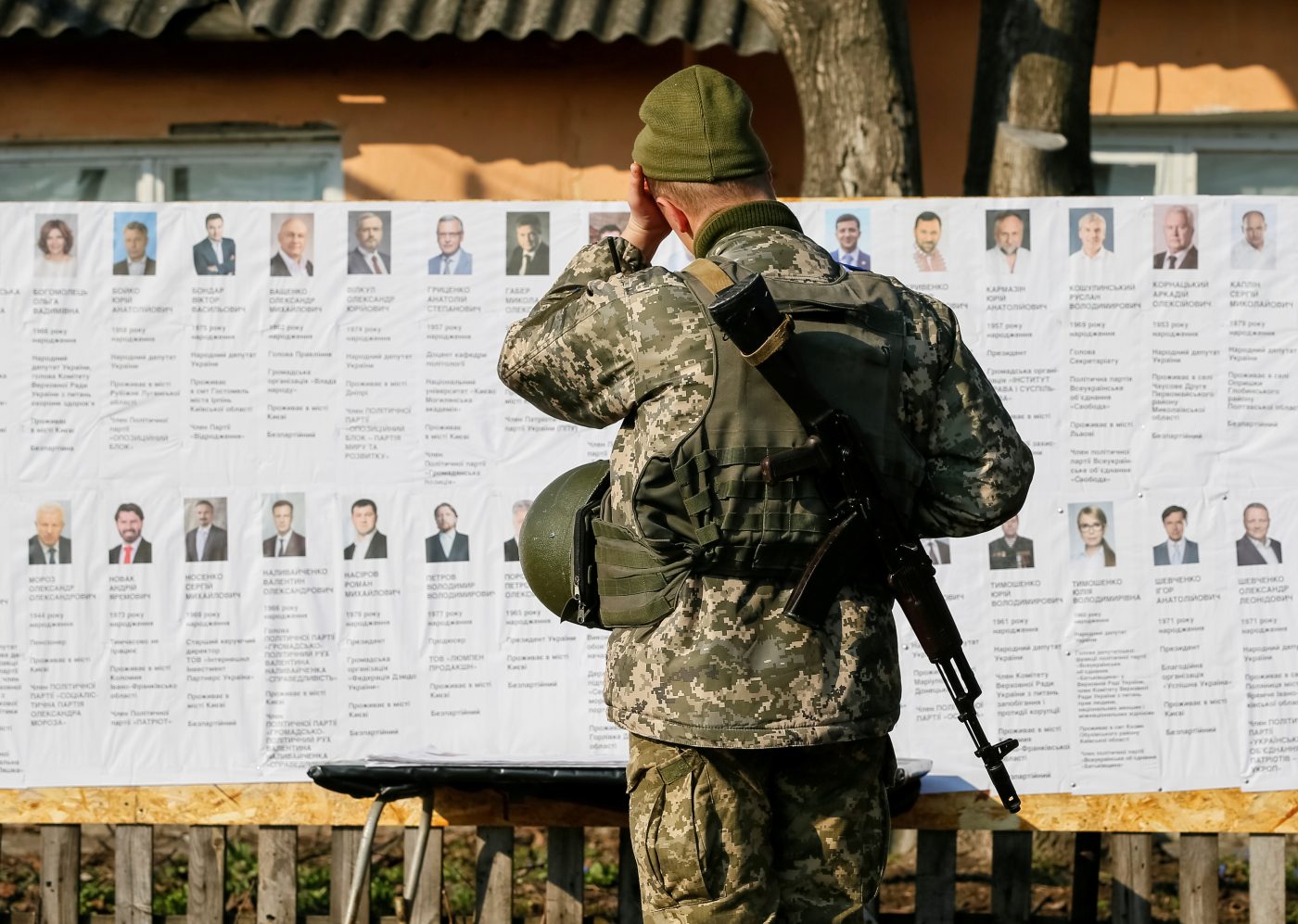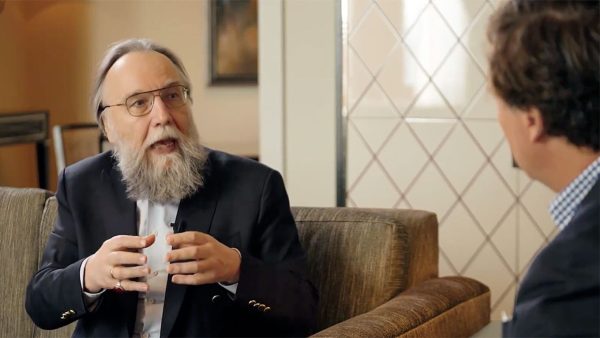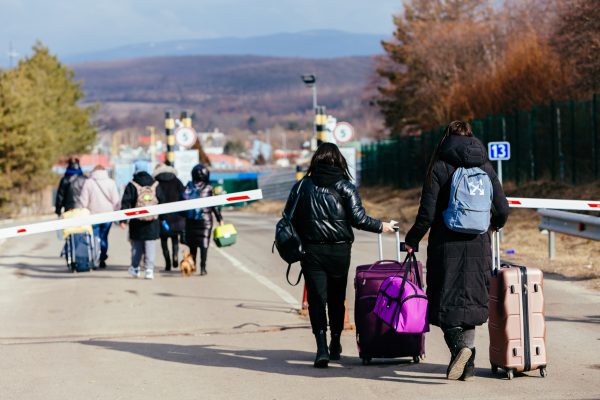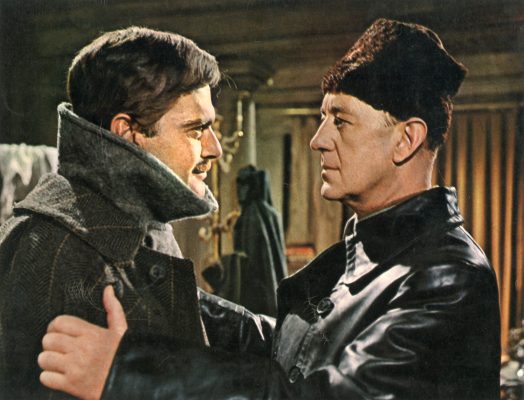Faced with the collapse of its key ally, France, and the massing of Nazi Germany’s cocksure legions on the shores of the English Channel, there was little dissent in London over the decision to postpone the elections due in late 1940.
“In this country, when the thoughts and energies of every one of us are continually occupied in a struggle upon which depends the future of British freedom, we cannot afford to exhaust ourselves in the domestic strife of a General Election,” Lord Simon, the Lord Chancellor told the upper house in November. Voters waited another five years for their moment (at which point, they evicted Winston Churchill from Downing Street.)
For many months, Ukraine also seemed likely to postpone nationwide ballots. It had a parliamentary vote due this year and a presidential vote next year. In the UK, the threat of impending invasion was enough to delay the election; Ukraine by contrast has hundreds of thousands of Russian troops on its land and battles blaze every day. Millions have been displaced, including 6.3 million who have fled to other countries.
This is not therefore a matter of choice. It’s a matter of practicalities and of the martial law regulation that governs wartime Ukraine and prohibits a vote. Or so it seemed until politics intervened.
It did not much matter when in May the president of the Council of Europe’s Parliamentary Assembly (PACE), Tiny Kox, called for elections regardless of the war. In July, the Speaker of the Verkhovna Rada, Ruslan Stefanchuk, cautiously noted that the issue might be open for discussion. But the issue really became a problem in August, when US Senator Lindsey Graham said during a visit to Kyiv that: “I want this country to have free and fair elections, even when it’s under attack.” Senior pro-Ukrainian US figures clearly matter for Ukraine’s hope of continuing aid from the US.
By September, President Zelenskyy was not ruling out such a possibility, although he added: “It is not a question of democracy. It is a question of security.” But the head of state’s position is uncertain — first, the president says elections are to be held in the spring of 2024, then calls the election discussion a provocative topic. We can be certain that Zelenskyy wishes to continue in office, since he has stated he will run if elections are held in 2024.
The government’s position was further muddied in early November when local authorities were instructed by the central government to undertake preparatory steps for a ballot.
For the time being, it’s probably safest to assume a presidential vote will not take place, just as the parliamentary vote has not taken place.
When voters do finally get their say, they will be asked to decide what sort of country they want to build, and that may be shaped by geopolitics.
Some in the US have suggested that Ukraine’s security should be much like that of Israel — heavily armed and likely engaged in warfare at regular intervals.
It may not be coincidental that Zelenskyy has from the outset used precisely this image in discussing the Ukraine of the future.
“Absolutely liberal and European, that’s something Ukraine will never be. But we will become a ‘big Israel’, with our own face of course”, he said and added there will be “armed forces in all institutions, supermarkets, cinemas, there will be people with weapons.”
Whether it wants it or not, security is and will remain Ukraine’s absolute priority for the foreseeable future.
And like Israel, senior military figures may well start to migrate to political positions. Most political parties will want to have ex-soldiers and volunteers on their campaigns, so it’s fair to assume the percentage of military representatives in politics will be substantial.
Yet relations between Zelenskyy and his commander-in-chief, Gen. Valery Zaluzhny, are understood to be strained — the president has darkly referred to “political forces push[ing] the military into politics” and to political parties seeking to enlist “war stars.”
The president may have cause for concern. Polling cited by The Economist suggests: “The president, once lauded for his role in defending the country, has been tarnished by corruption scandals in his government and by concern over the direction of the country. It cited internal polling numbers from mid-November showing Zelenskyy’s trust rate deflated to a net +32%, while the commander-in-chief enjoys the trust of around a net +70% of the population.
Not that voters are likely to be asked their formal opinion. There are a number of other serious problems arising from the idea of wartime elections, mostly related to security and representation.
Elections inevitably require people to concentrate at pre-determined sites to cast ballots. Many would be close to the frontlines. A recent case when Russian forces launched an airstrike on a funeral of a soldier which took the lives of one-sixth of the population of a village perfectly illustrates why it is absurd and dangerous to gather for elections.
Likewise, it is almost impossible to involve soldiers in elections for obvious reasons. In November, the Russian military struck a gathering of officers from the Ukrainian 128th Brigade around 20 were killed. Elections would therefore help Russian targeting officers as much as it aided Ukrainian democracy.
Current laws do not allow citizens to use postal ballots from abroad, thus making in-person voting in polling stations the only option. Considering the huge numbers of Ukrainians abroad (see above) it is unlikely that Ukraine could cope with the logistics. And that would bring into question the legitimacy of the elections.
As of now, eight out of ten Ukrainians oppose wartime elections. With the second year of war coming to its end, wartime politics are becoming loud and divisive.
For now, one thing is clear: Ukraine is not ready to hold free and democratic elections.
Kateryna Panasiuk is an author and journalist studying politics at the Ukrainian Catholic University. When war came to Ukraine, she set up a volunteer project to collect and share the stories of Ukrainians affected by the war.
Mykyta Vorobiov is a political adviser, journalist, and political science student at Bard College Berlin. Over the previous three years, he has studied at the Ukrainian Catholic University, the National University of Kyiv-Mohyla Academy, the University of Tartu, and the University of Zagreb. For the last two years, he has been developing articles for VoxEurop and others.
Europe’s Edge is CEPA’s online journal covering critical topics on the foreign policy docket across Europe and North America. All opinions are those of the author and do not necessarily represent the position or views of the institutions they represent or the Center for European Policy Analysis.





